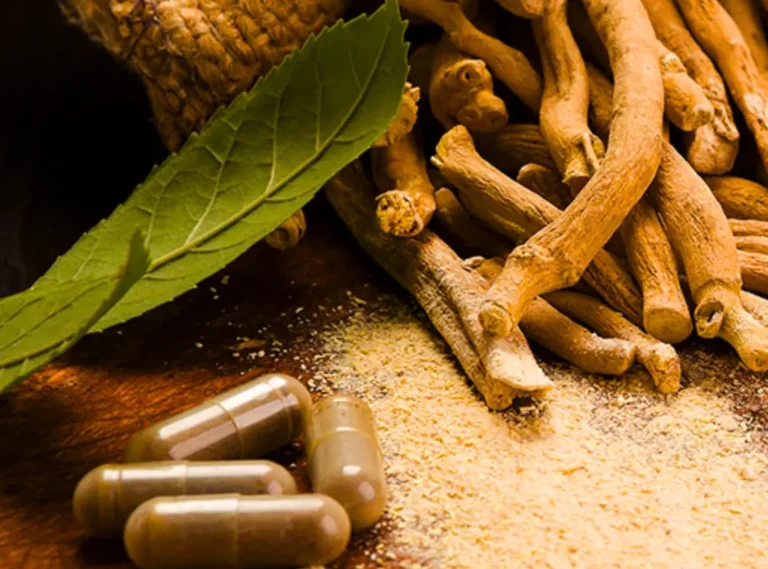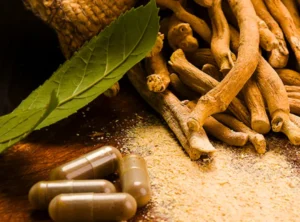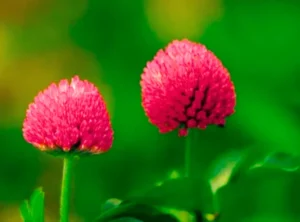What is Ashwagandha?

Ashwagandha (Withania somnifera), also known as Indian ginseng or winter cherry, is an adaptogenic plant widely used in Ayurvedic medicine for over 3,000 years. Adaptogens are natural substances that help the body cope with physical, mental, and emotional stress, promoting balance and vitality.
Its roots and leaves are used in supplements to help fight anxiety, insomnia, fatigue, and even support hormonal balance making it especially interesting for women going through menopause.
Adaptogens are natural substances that help the body cope with physical, mental, and emotional stress, promoting balance and vitality.
Its roots and leaves are used in supplements to help combat anxiety, insomnia, fatigue, and even improve hormonal balance, making it especially beneficial for women going through menopause. The concentration is quite effective for anxiety and insomnia, but it’s always important to consult a doctor.
How Does Ashwagandha Work in the Body During Menopause?

During menopause, estrogen and progesterone levels drop dramatically, causing a range of symptoms: hot flashes, insomnia, irritability, fatigue, anxiety, and even loss of libido.
Ashwagandha acts on the body in several ways:
Reduces stress and anxiety:
Regulates levels of cortisol, the stress hormone, which tends to increase during menopause due to the decline in key hormones
Improves sleep:
Its natural sedative properties help restore the sleep-wake cycle, combating common insomnia. Because high cortisol levels prevent normal sleep for the body and mind from resting properly, it’s difficult.
Supports hormonal balance: Although it doesn’t contain hormones, Ashwagandha supports the hypothalamic-pituitary-adrenal (HPA) axis, indirectly influencing sex hormone regulation.
Boosts energy and vitality:
Improves mitochondrial function and reduces physical and mental fatigue. With revitalized cells, the body becomes more regular.
Improves sexual health: Studies show improved sexual function and vaginal lubrication in women during perimenopause.
Why Is Ashwagandha Important During Menopause?

Menopause is a natural biological process, but its symptoms can be debilitating. Many women seek natural alternatives to hormone replacement therapy (HRT), especially when there is no medical recommendation.
Ashwagandha stands out as a safe, natural, and affordable option for:
Managing emotional symptoms (such as anxiety, irritability, and mild depression)
Relieving physical symptoms (such as hot flashes and fatigue)
Improving overall well-being and quality of life
Furthermore, by acting on the nervous and endocrine systems, it contributes to healthier aging and reduces the impact of menopausal symptoms on emotional and cognitive health. This allows for a more active life, free from fatigue or discomfort.
How Can I Find Ashwagandha at the Pharmacy?

Ashwagandha is available in the following forms:
As a standardized herbal supplement in capsules, usually containing a dry extract.
It is also found in formulations containing magnesium, vitamin B6, and maca root.
When purchasing, look for standardized extracts containing 5% withanolides, which is the active component with the greatest therapeutic evidence.
What Is the Recommended Ashwagandha Dosage?
Common doses found in the market include:
300 mg to 600 mg daily, usually taken in one or two capsules.
In some protocols, doses may reach 1,000 mg per day, depending on the formulation.
Important tip: Always consult a healthcare professional, especially if you are taking medications (such as antidepressants, anxiolytics, or anticoagulants), as interactions may occur.

Conclusion
Ashwagandha isn’t a “magic cure,” but it is one of the most promising medicinal plants for helping women navigate menopause with greater balance, energy, and well-being.
Like any herbal remedy, it should be used responsibly, as it can have side effects, just like with conventional medications. It should be used under professional guidance and with patience so that its benefits develop safely over time. Here, we’ll simply highlight natural options for navigating a challenging phase for some women.
Scientific Studies Supporting Its Benefits in Menopause
1. Study published in the Journal of Ethnopharmacology (2021)
Title: Efficacy and safety of Ashwagandha root extract in improving sexual function in healthy women: A randomized double-blind placebo-controlled study.
Results: Significantly improved sexual function, lubrication, and satisfaction in women with menopause-related dysfunction.
Conclusion: Ashwagandha is a safe and effective option for enhancing female sexual health.
2. Study published in the Journal of Alternative and Complementary Medicine (2019)
Title: Effects of Withania somnifera on menopausal symptoms and quality of life: A pilot study.
Results: Reduction in symptoms such as insomnia, anxiety, hot flashes, and irritability.
Conclusion: Ashwagandha may be a natural alternative for managing menopausal symptoms with few side effects.






